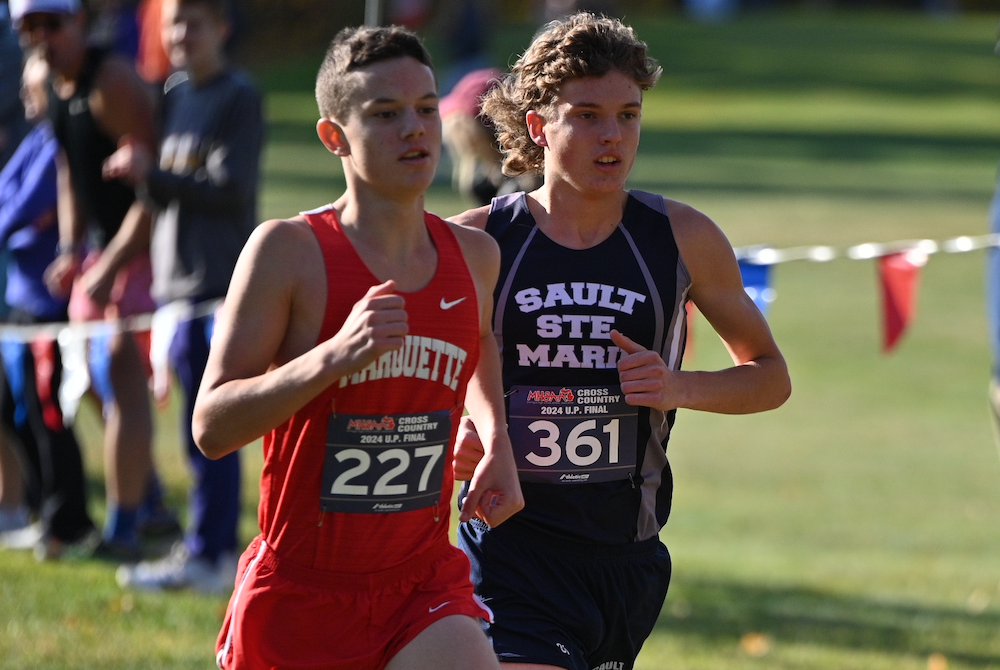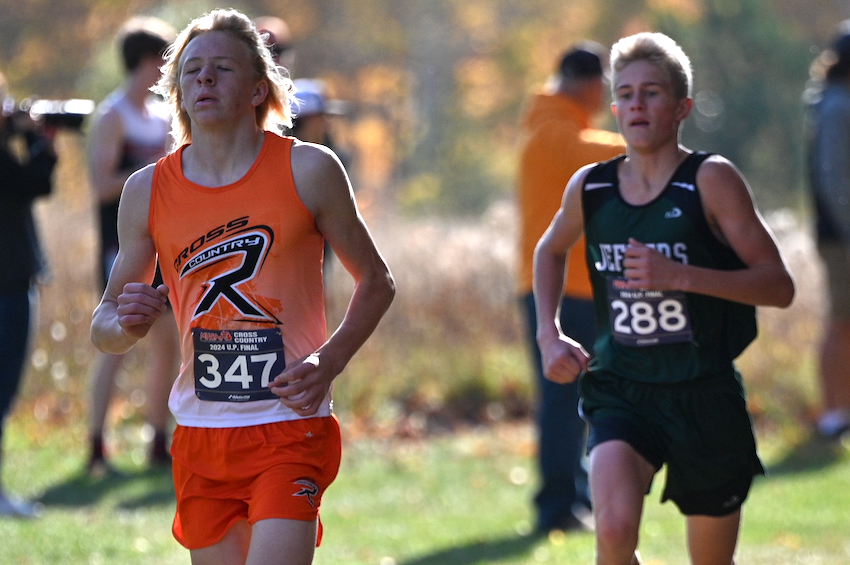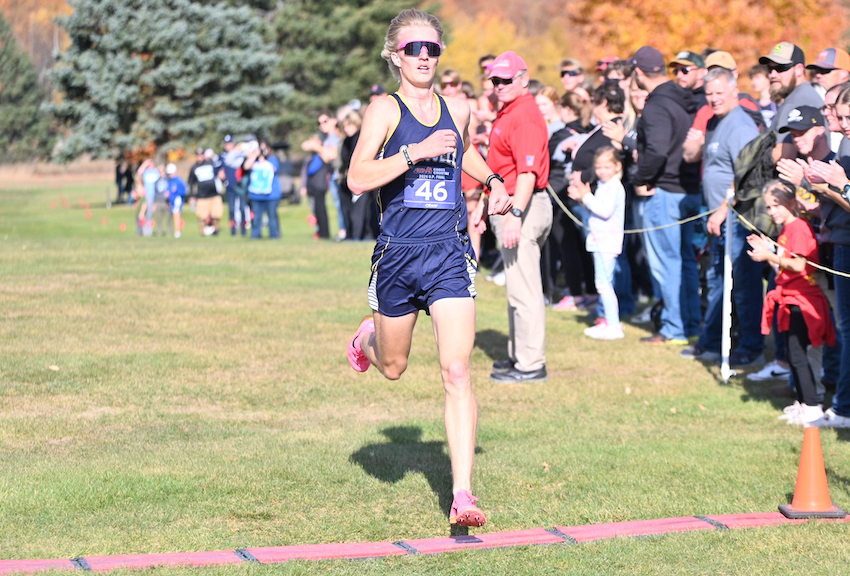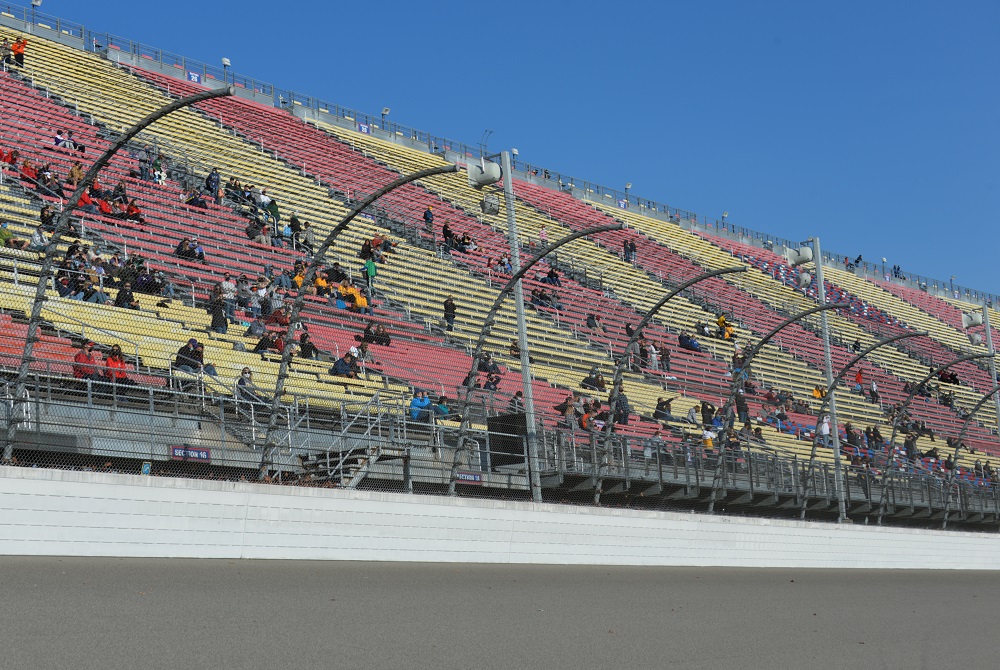
Litzner Sets UP Finals Record, Jeffers Reigns Again & Engadine for 1st Time
By
John Vrancic
Special for MHSAA.com
October 19, 2024
MUNISING — It was a cross country race for the ages here Saturday as nine boys runners broke 16:30 at the Upper Peninsula Division 1 Finals.
Sault Ste. Marie junior Gabe Litzner set the U.P. Finals all-class/division record, covering the 3.1-mile course in 15:14.4. He was followed by Marquette seniors Seppi Camilli (15:34.7) and James Barch (15:57.8).
“I came into this race very nervous,” Litzner said. “I knew Seppi was going to give me a good race. I felt the way to beat him was to stick with him in the first mile. I didn’t want to wait until the last mile or 800 meters. He’s very fast. I knew he would kick it in during the last mile.
“Adrenalin got me through the whole race, especially today. I knew it was going to be hard. It’s exciting to be part of U.P. history. It feels really great. I love running with these guys.”
Marquette captured its sixth consecutive title with 20 points, followed by Sault with 56 and Houghton with 89.
“We had a great season as a team,” Litzner said. “Marquette is just a great team. They’re real tough to beat. They’re one of the best in the state. I’ll never forget this U.P. Finals. It was a great time.”
Camilli’s time was the second-best in U.P. history, and Barch finished with the third best.
“I wish it would have been a little more exciting (individually),” Camilli said. “It was close through the first mile. I ran a 4:45, and I think it caught up with me in the end. It’s a little disappointing in a way, but it was still a good race. I was six seconds off my PR (personal record) at two miles and fell off a little in the third.
“Winning as a team was exciting for sure. It’s high pressure and exciting.”

Division 2
Painesdale Jeffers collected its fourth-straight Division 2 championship with 33 points, followed by Rudyard’s 81 and Ironwood’s 84.
Munising senior Dan Goss earned the top individual honor at 16:43. He was followed by Jeffers’ junior Cameron Anderson (16:55.2) and Rudyard junior Steven Kirschner (17:23.4) on a sunny and mild day at the Pictured Rocks Golf Course.
“Winning on our home course is awesome,” Goss said. “I definitely had special motivation. There was a lot of pressure, but our coaches are very supportive. We couldn’t ask for better.
“This happened to be my mom’s birthday, which also motivated me. I didn’t want to let her down. We had plenty of community support, which we appreciate.”
Ironwood senior Zach Smith was fourth (17:26) and Jeffers junior Landon Larson took fifth (17:30.9).
“The race was pretty good, but my legs weren’t feeling up to snuff,” Larson said. “It felt awesome to win as a team. We were going for a four-peat. I just ran fast and hard. Training during the summer helps. We came into the season in good shape.
“We have no seniors this year. We have a lot to look forward to.”

Division 3
Engadine was crowned U.P. Division 3 champion for the first time with 62 points, followed by Stephenson with 82 and 2023 champ Dollar Bay at 106.
“It’s pretty awesome,” Engadine coach Tracy Germain said. “As we were coming through the line, I knew we had it. There’s always little bit of doubt until it happens. This is a real boost for our program. We put a lot of work into it. It’s not a given.”
Chassell senior Kalvin Kytta earned his second U.P. individual title at 16:10.2.
“That was close to a PR,” he said. “I’m pleased with how the race went. I knew it would be a battle with myself for time and set goals for my split times. I fell off a little in the last mile, but I’m still pleased. When the gun went off for the Division 1 race, I got more excited for my race.”
Engadine senior Dakota Taylor was runner-up (17:22.2), with Ewen-Trout Creek freshman Brody Majurin third (17:28).
“We’re very grateful,” Taylor said. “It’s rewarding, and we feel very accomplished. I’m thankful to Tracy for everything she does. It’s so hard to get that first one.
“Last year we had a small group. It’s good to reach personal goals, but it’s even better with a great group of guys. I think Kalvin had 4:57 in the first mile. He ran a great race.”
PHOTOS (Top) Marquette's Seppi Camilli (227) and Sault Ste. Marie's Gabe Litzner (361) run together during the Division 1 Final on Saturday. (Middle) Rudyard's Steven Kirschner (347) and Jeffers' Cameron Anderson (288) are in the second and third position, respectively, after about one-third of the Division 2 race. (Below) Chassell's Kalvin Kytta crosses the finish line first in the Division 3 race at Pictured Rocks Golf Course in Munising. (Click for more from Cara Kamps/RunMichigan.com.)

MHSAA Vault: MIS Rose to Challenges to Host 2020 LP Finals
By
Rob Kaminski
MHSAA benchmarks editor
November 12, 2021
The “MHSAA Vault” features stories from past publications and other documents in the MHSAA Library. This issue takes a look at the MHSAA Cross Country Finals at Michigan International Speedway, which celebrated 25 years in 2020 – although it was an event that nearly didn’t happen last fall …
In 1996, the MHSAA and Michigan International Speedway began a partnership the changed the course of the Lower Peninsula Cross Country Finals – quite literally.
The land in and around the track at Brooklyn would host the Finals for all classes of runners in one place on one day, an annual festival of nearly 2,000 runners competing for the MHSAA’s top honors.
Even skeptics – and there were several among running purists who thought the course was too flat, for example – can’t deny the results.
Finals attendance nearly doubled in that first year, and crowds in excess of 10,000 have enjoyed a day of racing several times, including a record 12,153 in 2011.
Enthusiastic crowds were the norm in recent years, with 11,232 in 2017, and nearly 11,000 in 2018 (10,989) and 2019 (10,873).
In fact, attendance failed to reach at least 8,000 only twice since the move to MIS.
Of course, last year was an exception, when attendance was limited to 1,000 spectators per session due to the COVID-19 Pandemic. Fans also were restricted to the grandstands rather than following the action throughout locations on the course.
To reduce the number of runners in each race, the event was spread over two days, with each Division being run in two separate “sections” with times then combined at the end to determine team and individual champions.
While not ideal, the end result was another year of fantastic efforts at MIS – both from student-athletes and those behind the scenes.
“Even at the last hour, less than a week ahead of the Finals, we were closer to not having the Finals than we were to having them,” said MHSAA Assistant Director Cody Inglis, who coordinates the cross country postseason. “Rumors and challenges of mandated shutdowns, testing and other requirements were being discussed and caused a lot of unknowns. Even at the Regional level, we had schools, Regional courses and hosts shutting down their facilities; we had to relocate four Regionals 48 hours prior to race times. That scenario just could not happen at the Finals level where far more runners and much more travel would be involved.”
Among the many last-minute hurdles was the edict from NASCAR – which owns MIS – that all persons on site be temperature checked upon entry. That meant securing thermometers that were easy to operate in short order, along with personnel necessary to conduct the readings.
The attendance limitations certainly helped to implement the temperature screening, but brought their own issues.
“Limiting spectators was not a popular decision, but it really was the only way to have a race,” Inglis said. “We were taking direction and working with policies and protocols from the MDHHS, the Governor’s office, Lenawee County Health Department, MIS and NASCAR.”
Part of the solution was to utilize the grandstands as a “barrier” between participants and spectators. The reduced number of fans were dispersed over thousands of seats while still allowing them the chance to watch their student-athletes compete.
“It wasn’t the same, it wasn’t easy or perfect, but it was what we had to do to have a race,” Inglis said. “Separating the Finals into two days and different sections also allowed us to spread out the event and limit the number of people on site at any one time. This was a key part of the plan and worked well even though it separated races within a Division.”
The MHSAA, MIS and the cross country community never lost focus of the main goal: a culmination of the season for the student-athletes, who deserved something last year more than ever. And, more than ever, MIS once again displayed its advantage as a venue that could adapt to the fluid nature of the times to pull off the event.
“There were some thoughts of using four different sites, but as we learned during the Regionals, the climate of things was so tenuous from one area of the state to another that we couldn’t be 100-percent certain that there wouldn’t again be last-minute cancelations,” Inglis said. “MIS was wonderful to work and collaborate with, and was the best option to get it done. It was never mentioned once publicly about the possibility of not having the Finals – only how we could best do it under uncharted conditions.”
The moving parts and ever-changing scenarios created more complexity than ever in finalizing a season, but every decision was made with the complete desire to conduct the Finals as close to normal as possible.
“I firmly believe that a finish to the season, no matter the differences in race formatting and fan experience, was something everyone would have taken when the season began in August,” Inglis said.
Indeed, the finish line in Year 25 at MIS might have been the most gratifying of them all.

